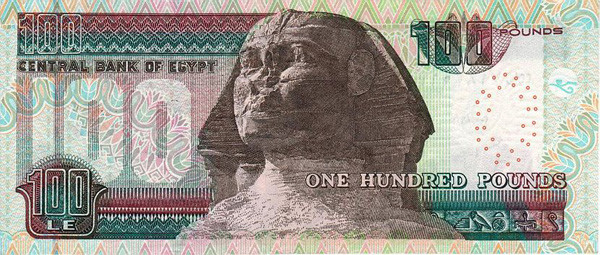Egypt’s dollar woes
By Khaled Diab
Hopes are devaluation will resolve Egypt's dollar crisis, but the situation could spin out of control without a global currency for international trade.

Monday 11 April 2016
As Egypt's economy continues to nosedive, the country has been gripped by a chronic dollar crisis in recent months, exacerbated by falling revenues from tourism and the Suez Canal.
The dollar shortage has fuelled inflation and severely hurt importers and domestic manufacturers who depend on imported raw materials or components. For instance, many imported medicines have become totally unaffordable and there is a shortage in locally produced generic alternatives due to the inability to import active ingredients.
The hard currency shortage has even affected the black market, with a number of reports in the Arabic media over hours-long searches for dollars at inflated prices.
To tackle the situation and to cool the overheated black market, the Egyptian Central Bank decided to devalue the Egyptian pound by 13 percent and to sell $198 million to commercial lenders at 8.85LE, from its previous level of 7.73LE.
The Cairo stock exchange, along with financial analysts, was jubilant at the news, recording its largest single-day rise, of 7%, since July 2013, and ending the week a massive 14% up.
However, the effect on Egypt's long-suffering poor and vulnerable will be far less benign – their underpaid labour has also been devalued.
“Egypt's poor are enduring the brunt of Egypt's economic crisis,” observes Timothy Kaldas, a non-resident fellow at the Tahrir Institute for Middle East Policy, in a reference to the high inflation, removal of subsidies, and increased unemployment which have corroded living standards. “The devaluation will undoubtedly increase the cost of certain essential goods, particularly food.”
Continued and worsening hardship for the masses is also bound to hurt the regime. Support for President Abdel-Fattah al-Sisi was predicated on his much-hyped capacity to bring Egypt to a safe port of stability and prosperity.
So far, the Sisi regime has demanded of ordinary Egyptians to tighten their belts, while cushioning the wealthy, has given activists and critics a royal belting, and has been unable to keep a rein on spiralling terrorism and insurgency. In addition, despite escalating repression, industrial action continues to sweep across the country (Arabic).
And this disaffection and instability is only bound to grow if the regime delivers only immense pain and no gain.
The Central Bank's devaluation and loosening of the official exchange rate may not be enough to salvage the situation if Egyptians continue to face dollar shortages and if those receiving remittances from abroad find better prices on the black market, argues Kaldas.
Central Bank Governor Tarek Amer has vowed to do whatever it takes to keep the currency market in check.
However, the early signs were not promising. Despite the devaluation and dollar injections, the Egyptian pound weakened on the black market, reaching 9.55LE to the dollar shortly after the devaluation, while the devaluation is further fuelling a property bubble. In early April, it stood at 10.30LE, according to Reuters, though the official rate has remained stable at 8.78LE.
This has led financial analysts to expect further cuts in the official rate, with the attendant pain it will cause ordinary Egyptians. JP Morgan forecasts that the Egyptian pound will be devalued by a total of 35%this year, with a projected inflation of 14%.
And as has been demonstrated elsewhere in the world umpteen times in the past, from Argentina to Germany, the situation could easily spiral out of control, if these measures elicit panic rather than confidence, or if speculators run the pound into the ground.
Beyond Egypt's specific economic woes and poor governance, this points at a deeper, wider malaise: how the global trading system is stacked and loaded against smaller economies.
The main reason Egypt and other countries suffer from “dollar crises” is because the US dollar is the world's dominant reserve currency and the main medium of international trade, though the euro has closed the gap in recent years.
Obliging smaller and poorer economies to trade in the dollar and other reserve currencies makes them vulnerable to the whims of the currency markets and forex speculators.
In addition, the dollar and euro distort trade in favour of the United States and Europe, enabling them to import and borrow far more cheaply than their fundamentals should allow.
But there are downsides for top-dog economies, such as making their exports less competitive and the inevitable trade deficits caused by the “Triffin Dilemma”. The unnaturally low cost of credit has played a central role in the US's dangerously high public debt – on which it has come perilously close to defaulting – and contributed to the US subprime crisis and the European sovereign debt crisis.
The solution to this, in my humble view, is the introduction of a single global currency for the purposes of international trade. This would help remove the volatility of currency markets, end speculation, eliminate the currency black markets, and even the global economic playing field.
This is not a new idea. John Maynard Keynes, the legendary British economist, proposed just such a currency as the lynchpin of the post-war economic order, but was torpedoed by American opposition. Following the volatility and crises which have afflicted the global economy in recent years, China, Russia and other emerging powers have also called for just such currency reform.
A world trading currency would not only help stabilise and boost the global economy, it would also reduce the social fallout caused by dollar shortages and the immense inflationary pressures they create.
____
Follow Khaled Diab on Twitter.
This is the updated version of an article which first appeared on Al Jazeera on 28 March 2016.


Pingback: Banks in Egypt say outstanding dollar requests mount up - The Chronikler